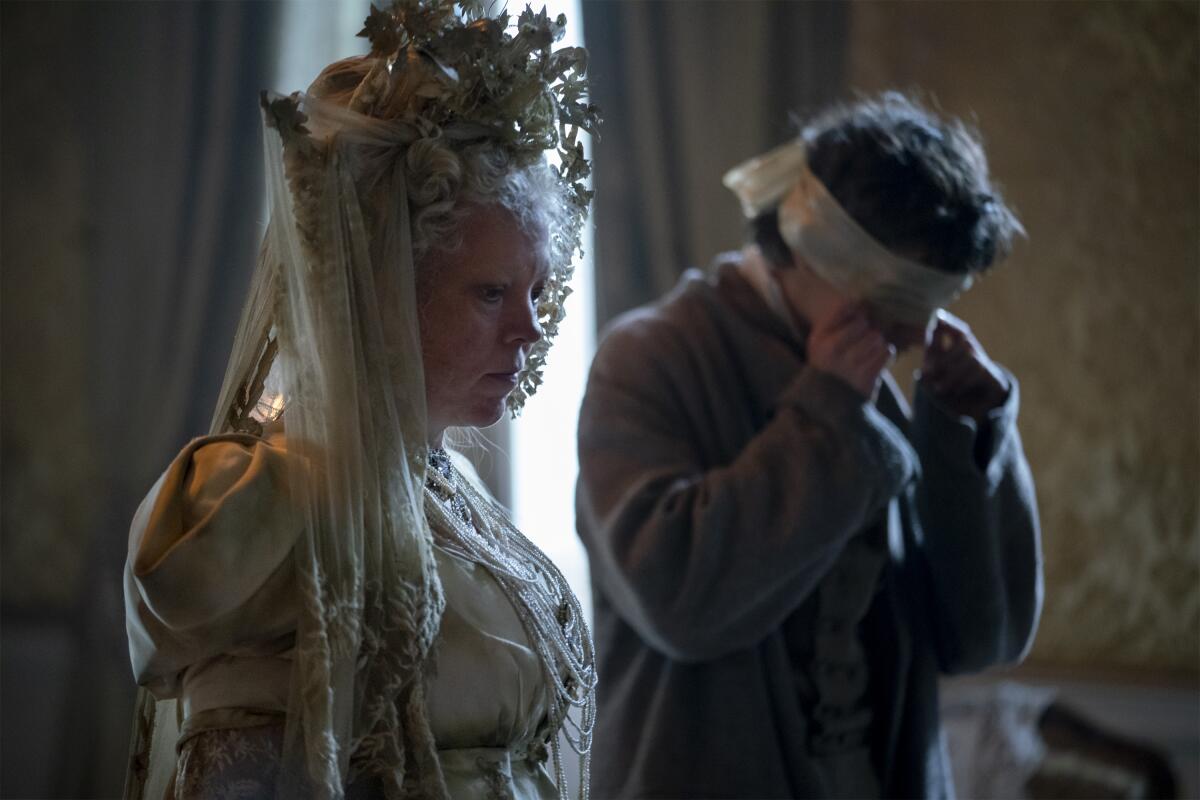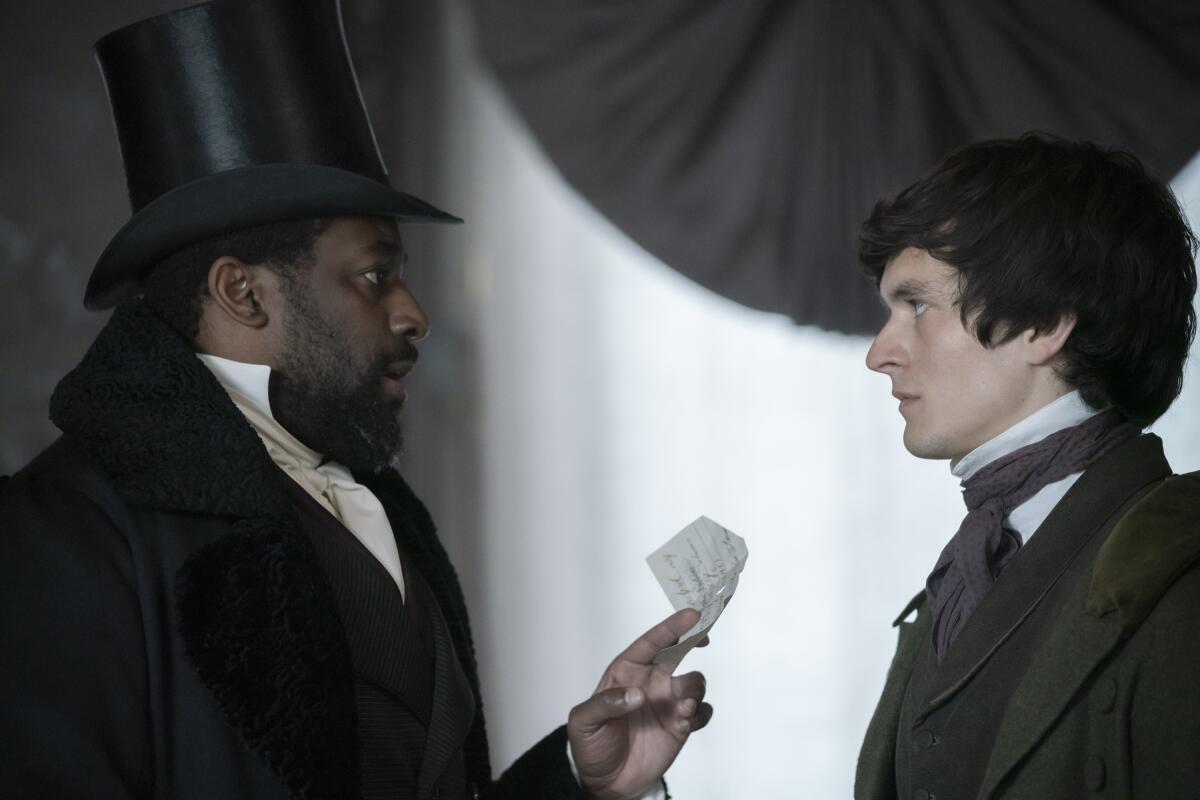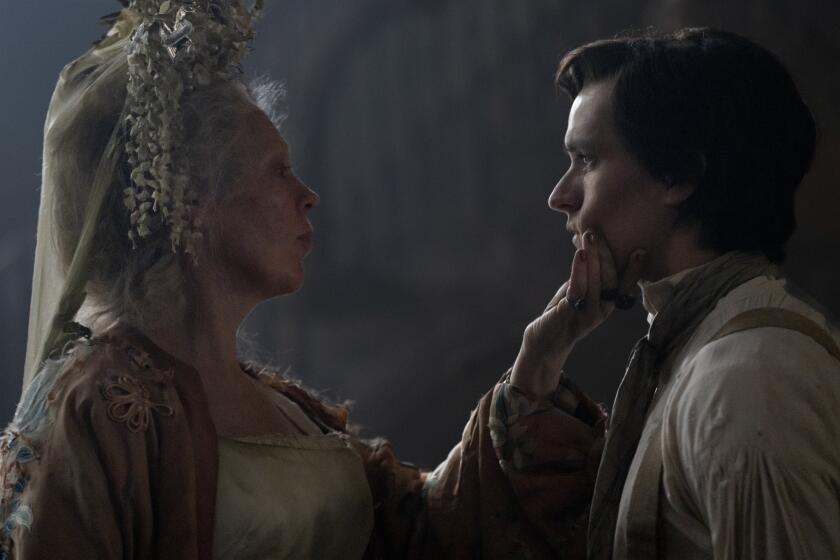‘Great Expectations’ review: A dismal remodel of a Charles Dickens tale

- Share via
FX, in partnership with the BBC, has made a dreary, dismal and not very Dickensian miniseries out of Charles Dickens’ “Great Expectations.” And while that seems to be in some measure the point, it is, all the same, dreary and dismal and does not count so much as an adaptation as a remodeling.
Steven Knight, who created the dark period crime drama “Peaky Blinders,” has taken the novel down to the studs and erected something quite different in its place. The outlines are vaguely recognizable, but the rooms are all different: The windows have been changed into doors and the doors into windows, and the walls have been painted black — the better not to see anything with.
Premiering Sunday on FX on Hulu, this version begins with its main character, Pip (Fionn Whitehead), about to hang himself — nothing you’ll find in the book — announcing in no uncertain terms that This Is Not Your Great-Great-Great-Great-Grandfather’s “Great Expectations,” or really anybody’s, because it is not really “Great Expectations.”
You’ll sometimes hear things along the lines of, “If Beethoven were alive today, he’d be writing film scores,” or “Da Vinci would be all about AI.” But it’s no great stretch to suggest that if Dickens were around now, television would be just his meat. His novels — with large casts of colorful major and minor characters in A and B and C stories and on down the alphabet — were published serially; he knew his way around a cliffhanger, loved a big reveal and wrote dialogue that fits well in an actor’s mouth. There are reasons that apart from Shakespeare, no writer in English has had his works so often — and often memorably — translated to the screen. There are obviously reasons for making this “Great Expectations,” but they have more to do with the TV business than with Dickens.
Steven Knight’s adaptation of Charles Dickens’ classic novel is set in a grittier, dirty London where subjects like sex and drug use aren’t taboo.
Affairs start more or less as they do on the page. Pip, who lives with his semi-abusive, much older sister Sara (Hayley Squires) and her sweet-natured blacksmith husband Joe (Owen McDonnell) in a village on the coastal marshes of Kent, encounters Magwitch (Johnny Harris), an escaped convict, in the churchyard and is frightened into fetching him food and a file. After a tussle with his nemesis and fellow convict Compeyson (Trystan Gravelle), Magwitch is recaptured and transported to Australia.
Through the offices of Mr. Pumblechook (Matt Berry), Pip is enlisted to become the playmate of Estella (Shalom Brune-Franklin), the adopted daughter of local crazy rich lady Miss Havisham (Olivia Colman). Miss Havisham has not left her house, or stepped out of her wedding dress, since she was abandoned at the altar many years before, and she is raising Estella to become a heartless destroyer of men. Estella toys with Pip and treats him rudely, which only makes him love her all the more and regret his low status. As fate would have it, Miss Havisham’s lawyer, Jaggers (Ashley Thomas), arrives to say that Pip has become the beneficiary of an anonymous windfall, and off he goes to London to become “a gentleman” — the fool.

After that, it’s anybody’s guess. Characters are remade beyond recognition. Odds and ends from the book — references to Cairo, the business of marine insurance — get new weight and a different context. Knight has taken the novel’s Gothic elements and smeared them over whatever was light or comical or ironical in the original. In their stead, we get guns and knives, drugs and perversions, public urination and — authentically enough — horse poop.
Not trusting that a person losing his moral compass in the pursuit of status is drama enough — or perhaps just feeling that it had already been done — Knight has chosen to embroil Pip in crime and corruption under the influence of Jaggers, a minor character in the book who becomes a major one here. (“I am known to be evil,” says he.) There are nods to systemic exploitation — Miss Havisham’s inherited fortune comes from “opium, indigo and slaves” — and some random expressions of feminism and activism. (Pip’s childhood friend Biddy, played by Laurie Ogden, will declare near the end, “I’m a Chartist now,” referring to the working-class protest movement. But she has, paradoxically, been given little to do within the series itself.)
No one doubts that Olivia Colman is a great actor; I expect to see her nominated for some or another award for her Miss Havisham. I love Matt Berry, who, as much as any actor alive, was born to play characters from Dickens. Thomas has great vocal authority; it’d be nice to hear him read Shakespeare. Still, I wouldn’t pass final judgment on any actor by their work here. Most are unable to rise above the stylistic miasma of the production — Whitehead sounds narcotized even when Pip isn’t on drugs — or the entirely new words they’ve been asked to say. (“That is the reason I have decided not to blow your f— brains out right here in this alley,” is most definitely not Dickens.) Even Jaggers’ title-spawning announcement of Pip’s “great expectations” has been erased in favor of “I’ll teach you first to be a rat, then a snake, then a vulture, then with blood dripping from your beak I will teach you how to be a gentleman.” OK.
If we decouple the series from its source, what then? Many viewers won’t have read the book or seen any earlier adaptations. On its own merits, it’s still a gloomy, violent slog, insistent on the eeriness of most every scene, including ones that don’t merit the treatment. It’s laden with spooky sound effects, a moody, discordant score and postproduction coloring to erase any trace of natural light. The series becomes sillier as it becomes more serious, wending its way to a bizarrely cheerful conclusion — given the dour preceding hours — that shares only a fire with its literary antecedent. None of the character development feels earned. The narrative threads are clumsily engineered; their tying up feels pat.
In the sense that the filmmakers seem to have accomplished exactly what they set out to do, I suppose you could call this “Great Expectations” a success. For “Peaky Blinders” fans, it may be just the Dickens they’ve been waiting for. And they are welcome to it.
More to Read
The complete guide to home viewing
Get Screen Gab for everything about the TV shows and streaming movies everyone’s talking about.
You may occasionally receive promotional content from the Los Angeles Times.








